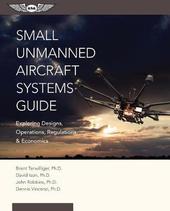
|
Small Unmanned Aircraft Systems Guide: Exploring Designs, Operations, Regulations, and Economics
Mixed media product
Main Details
| Title |
Small Unmanned Aircraft Systems Guide: Exploring Designs, Operations, Regulations, and Economics
|
| Authors and Contributors |
By (author) Brent Terwilliger
|
|
By (author) David C. Ison
|
|
By (author) John Robbins
|
|
By (author) Dennis Vincenzi
|
| Physical Properties |
| Format:Mixed media product | | Pages:285 | | Dimensions(mm): Height 229,Width 185 |
|
| Category/Genre | Aerospace and aviation technology
Aircraft |
|---|
| ISBN/Barcode |
9781619543980
|
| Audience | |
|---|
|
Publishing Details |
| Publisher |
Aviation Supplies & Academics Inc
|
| Imprint |
Aviation Supplies & Academics Inc
|
| Publication Date |
16 April 2017 |
| Publication Country |
United States
|
Description
The utility and benefits of unmanned aircraft systems (UAS) are emerging and being recognized across the aviation industry. While this technology is not new, the ability to support domestic public and private operators is becoming better understood and opening up new uses to government organizations and commercial enterprise. Analysis of the unmanned aviation market indicates that small UAS (sUAS) will become the most prevalent and affordable form of unmanned aircraft available, featuring technology developed by contributors ranging from DIY and hobby model aircraft communities to defense contracting. This book will help readers understand what a drone or UAS is, what forms are available (including multirotor, fixed-wing, and hybrid types), to make well-informed decisions regarding purchase and use. Readers will learn how sUAS and their various configuration options can be used to address or support evolving business needs. Ultimately, readers will have enough information to formulate a plan to acquire necessary certification approvals and operate sUAS in a safe, efficient, and effective manner. Beginning with the history of UAS and ending with how to prepare for the future of this fast-paced and innovative industry, this book contains descriptions of typical sUAS architecture, related technology, common uses, and suggested safety practices, while also providing a narrative to help you determine the most appropriate path forward through complex legal, business, operational, and support considerations. Understanding how these pieces fit together, from the technical and legal perspectives, will shape your own strategy for the safe, efficient, and effective use of this "(r)evolutionary" technology. The authors developed this book to share critical background, concepts, guidance, and lessons learned from their collective experience as researchers, operators, and academic instructors to dispel common myths and provide a starting point to explore how sUAS can be applied to solve challenges and support economic pursuits. Written for experienced aviators, as well as those new to aviation and operating in the National Airspace System (NAS). Illustrated extensively throughout, each chapter concludes with review questions for classroom and self-study use; glossary and index included. This book provides a solid foundation for keeping up with this fast moving and exciting aviation field.
Author Biography
Dr. Brent Terwilliger is an Assistant Professor of Aeronautics and the Program Chair for the M.S. in Unmanned Systems degree at the Embry-Riddle Aeronautical University (ERAU), Worldwide Campus, College of Aeronautics, in Daytona Beach, Florida. He holds a Ph.D. in Business Administration from Northcentral University, a master's of aeronautical science and B.S. in Aerospace Studies from ERAU, and has more than a decade of experience in defense contracting. Dr. David Ison is an Assistant Professor of Aeronautics and the Research Chair of ERAU, Worldwide Campus, College of Aeronautics. He holds a Ph.D. in Educational Studies/Higher Education Leadership/Aviation Higher Education from the University of Nebraska Lincoln, a master's of aeronautical science from ERAU, and a B.S. in Aviation Management from Auburn University. Dr. John Robbins is an Assistant Professor and the Program Coordinator for the B.S in Unmanned Aircraft System Science degree at the ERAU Daytona Beach campus. He holds a Ph.D. in Agricultural and Biological Engineering from the University of Florida (UF), master's in aeronautical science from ERAU, and a B.A. in Geology from UF. Dr. Dennis Vincenzi is an Assistant Professor of Aeronautics and the Department Chair of the ERAU, Worldwide Campus, College of Aeronautics, Department of Aeronautics, Undergraduate Studies. He received his Ph.D. in Human Factors Psychology in 1998 from the University of Central Florida, Orlando, Florida.
|